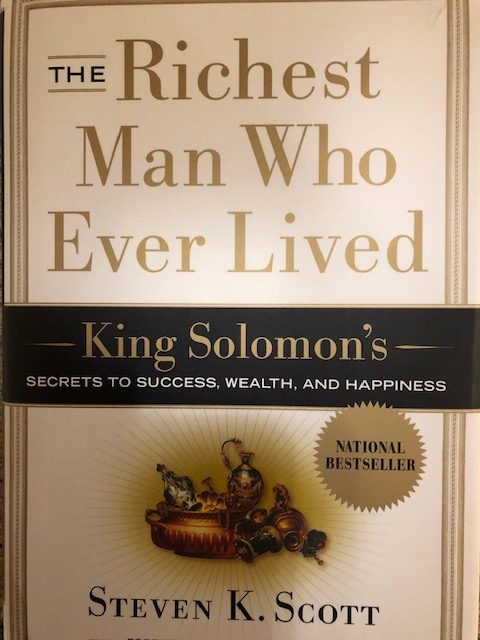Click here to return to Blog Post Intro

How the Richest Man who Ever Lived Can Make You Happier, More Successful, and Wealthier
Just as there are physical laws that govern the physical universe, Solomon reveals “laws of living” that invisibly govern all aspects of life.
Solomon implores us in Proverbs 2:4 to search for wisdom and knowledge as we would search for silver or buried treasure. To do this, we must often look deeper beneath the surface.
George Washington, Thomas Jefferson, Abraham Lincoln, Henry Ford, and Thomas Edison were all readers of Proverbs in their youth.
The Key to Winning Every Race
According to Proverbs 22:29, “Do you see a man diligent in his business? He shall stand before kings.”
Diligence is a skill that can be easily learned and used by anyone, but less than 1 in 1000 people fully utilize it. The dictionary describes diligence as “a persistent and hard-working effort in doing something.” Persistence is certainly a part of diligence.
Diligence is also about doing things “right”—expeditiously, efficiently, and effectively. In other words, doing it on time to the highest standards possible, regardless of what is expected or demanded.
Diligence is a learnable skill that combines: creative persistence, a smart-working effort rightly planned and rightly performed in a timely, efficient, and effective manner to attain the result that is pure and of the highest quality of excellence.
It is human nature to follow the path of least resistance (our innate laziness). Solomon identifies these four root causes of laziness:
- Self-centeredness: Every man’s way is right in his own eyes (Prov. 21:2)
- Conceit (arrogance): The sluggard is wiser in his own conceit than seven men who can render a reason (Prov. 26:16)
- Ignorance
- Irresponsibility (at times the last two are combined as “foolishness”): Proverbs 24:30-31 says, “I went by the field of the slothful, and by the vineyard of the man void of understanding; And lo, it was all grown over with thorns, and nettles had covered the face thereof, and the stone wall thereof was broken down.”
While others might fight to be noticed, the diligent are sought out by people in positions of authority and prominence. Here are four steps we can take to bring diligence into our lives:
- Wake up to reality. Take responsibility for your life, your attitudes, your values, and how you spend your time. Proverbs 6:9-11: How long will you lie there? When will you get up from your sleep? Poverty will come on you like a bandit and scarcity like an armed man.
- Define your visions. Where we have no vision, we lose our direction, our motivation, our joy, our passion, our energy, our creativity, and our commitment. (Prov. 28:19). To Solomon, a vision is not abstract at all. For him, gaining a true vision was more like using a highway atlas. It means having a perfectly clear picture of an ultimate destination, and a detailed road map to get there.
- Effectively Partner. Proverbs 15:22 – http://www.outofthisworldleadership.com/2019/12/01/proverbs-on-planning-the-future/ says, “Plans fail for lack of counsel, but with many advisers, they succeed.”
- Pursue wisdom; Build your life on it. Proverbs 16:16 says, “How much better is it to get wisdom than gold! And to get understanding is to be chosen above silver.”
Solomon’s Power Secret for Turning Dreams into Reality
Hope is the source of perpetual mental and emotional fuel available to us to achieve our dreams. Solomon’s concept of hope was “a well-founded and confident belief that a specific vision (goal, desire, or promise) will be achieved or fulfilled within a specified amount of time.”
Try this Vision Mapping Process:
- Starting with your most important dream in any given area, write a clear and precise description of that dream. This description should be at least a sentence or two, but no more than a single page.
- Create a “Goals Page” for that specific dream. Make a list of specific, intermediate goals that need to be achieved to fulfill that dream.
- Create a page for each goal and label that page “Goals to Steps”. List the intermediate goal you want to achieve, then list the steps that need to be taken to achieve that goal.
- Create a “Steps to Tasks” page, listing specific tasks that need to be completed to take that step.
- Assign completion dates to each task and step. Complete each step, one by one, until you have achieved your dream.
The Key that Opens Any Door
The #1 problem in business and life is ineffective communication. Whether at work or at home, most ideas are ignored or rejected not because they’re bad ideas but because they’re in effectively or unpersuasively communicated. According to a survey of business owners and corporate CEOs, ineffective communication is the #1 problem in business. According to Dr. Gary Smalley, it is also the #1 problem in relationships.
Solomon says the wise man or woman will use communication to bring healing and health to others. In Proverbs 16:24, he writes, “Pleasant words are as an honeycomb, sweet to the soul and health to the bones.” Proverbs 12:25 says, “Heaviness in the heart of man makes it stoop; but a good word makes it glad.” Words of praise, appreciation, encouragement, and understanding can penetrate one’s mind and heal one’s very soul.
Throughout our lives, we are faced with opportunities to communicate in ways that either foster healing and health or inflict pain. Most people have no idea just how much power resides in what they say and how they say it. Choose your words and how you frame them wisely.
Solomon’s 8 Keys to Communication:
- Speak in such a way that you make others want to listen. Proverbs 15:2 says, “The tongue of the wise makes knowledge acceptable, it the mouth of fools spouts folly.”
- Learn to become persuasive. Proverbs 16:23 says, “The heart of the wise teaches his mouth and adds persuasiveness to his lips. Don’t talk every time you feel like talking. Instead, take control of what you say. Learn when to speak and when not to speak.”
- Listen before speaking. Proverbs 18:13 says, “He that answers a matter before he hears it, it is folly and shame unto him.”
- Be slow to speak, and guard your words carefully. Proverbs 29:20 says, “Do you see a man who is hasty in his words! There is more hope for a fool than for him.” Likewise, Proverbs 13:3 says, “The one who guards his mouth preserves his life; The one who opens wide his lips comes to ruin.”
- Never tear others down—rather, build them up.
- Stop while you’re ahead. Proverbs 10:19 says, “When there are many words, transgression is unavoidable. But he who restrains his lips is wise.”
- Share genuine wisdom. Proverbs 10:31a says, “The mouth of the just brings forth wisdom. When someone genuinely has something worthwhile to say, Solomon encourages them to share it.”
- Always speak truthfully. Proverbs 10:18 says, “He that hideth hatred with lying lips, and he that uttereth slander, is a fool.”
The Great Accelerator: The Key to Maximum Success in Minimum Time
Most people seek a partner only when they are in trouble or when they have an obvious need they can’t handle by themselves. A partner or counselor is anyone who can provide needed insight, advice, wisdom, or any practical help for the effective achievement of a specific project, goal, or dream.
Enlisting the aid of wise counselors and good partners is critical to achieving success and achieving it as soon as possible. In Proverbs 15:22, Solomon tells us that without counsel, your purposes, plans, goals, or work will be frustrated, disappointed, or completely stopped.
Consider this: 70% of all new businesses fail within the first year of operation. Failure rates in business and in marriage are cut by two-thirds when counselors are brought into the equation, before the business is started or the marriage vows exchanged.
Proverbs 11:14 tells us that without the aid of counsel, you will fall. The terrifying aspects of a fall are: You never see it coming, you lose all control, and you suffer injury to one degree or another. Solomon assures us that whatever success you might achieve by yourself, with the right partner you’ll achieve a level of success that is wildly better!
Solomon offers seven red flags to watch out for when choosing a partner or counselor:
- A lack of integrity. Proverbs 29:24 points out, “Whoever is partner with a thief hates his own soul.”
- A quick temper or deep-seated anger. Proverbs 22:24 warns, “Make no friendship with an angry man; and with a furious man thou shalt not go.” Dr. Gary Smalley states that anger is the single most destructive force in a relationship. An angry person will set aside reason, personal responsibility, and matters of conscience under the driving force of their anger. Sooner or later, their anger will bring them down and their partners will take the fall with them.
- Proverbs 14:7 cautions, “Leave the presence of a fool, or you will not discern words of knowledge.”
- Anyone who suffers a lot for a little. People and opportunities that ask for very little and promise a lot I return are people not to be trusted. When you run into them, turn around and run the other way.
- The excessive use of flattery. Proverbs 29:5 says, “A man that flatters his neighbor spreads a net for his feet.” Proverbs 26:28 similarly notes, “A lying tongue hates those it crushes, and a flattering mouth makes ruin.”
- An inclination to gossip and exaggerate. Proverbs 20:19 explains, “He that goes about as a tale bearer reveals secrets; therefore meddle not with him that flatters with his lips. Solomon distrusted big talkers, people who talk a lot and perform little.”
- A disregard for rules, regulations, laws, or personal boundaries. Proverbs 28:7 says, “Whoso keepeth the law is a wise son, but he that is a companion of a riotous man shameth his father.”
How to pick the right counselors and partners and avoid the wrong ones
When specifically looking for counselors and advisers, examine their “walk” before you listen to their talk.
Assess your own strengths and weaknesses. What you usually don’t need is a partner who is a carbon copy of yourself.
Is your potential partner a positive person or not? People who are negative tend to be very poor partners.
The Happiness Secret
Nearly 3,000 years ago, Solomon wrote what medical researchers have only recently discovered, that being truly happy produces wonderful health benefits. Happiness is a heartfelt joy that is consistent, persistent, and lasting.
Solomon suggests that no matter what reasons you have to be ungrateful, there are even more and better reasons to be grateful. In Proverbs 20:12, he even points out that our eyes and ears should be appreciated as the incredible gifts they are.
We can’t prevent envious thoughts from entering our hearts, but we can keep them from taking root. Like Martin Luther said, “You can’t stop a bird from landing on your head, but you can stop him from building a nest on it.” The antidote is gratefulness.
When you find yourself envying what others have, remind yourself of three important facts:
- You don’t know the whole story of the challenges in other people’s lives.
- Everything a person owns is left behind at death.
- And death can take anyone at any time.
Whenever you feel envy, let your feelings of envy serve as a signal to reset your focus on those things for which you are grateful.
The Five Qualities that Make You Invaluable
Solomon reveals five qualities that, when developed and nurtured, will make anyone highly valued by others, both personally and professionally.
- Diligence
- Kindness & Truth
Proverbs 3:3-4 says, “Do not let kindness and truth leave you; Bind them around your neck, Write them on the tablet of your heart.” Whenever you’re kind to someone, it raises their level of commitment and loyalty to you. Kindness is a mental and emotional muscle that is exercised only when we make a conscious choice to do so. It forces us to set aside our personal needs and desires long enough to focus our attention on the genuine needs of others. When we choose this muscle, we must overpower our reflective self-centeredness.
- Honesty
There are only three reasons to be dishonest: (1) To promote ourselves; (2) To protect ourselves; or (3) To manipulate the thoughts, feelings, and actions of others.
- Generosity
Generosity is the quality that receives more than it gives. Proverbs 11:24-25 says, “One man gives freely, yet gains even more; another withholds unduly, but comes to poverty. A generous man will prosper; he who refreshes others will himself be refreshed.”
- Graciousness
Graciousness is an attribute that raises you up in the sight of others. Proverbs 11:16 explains, “A gracious woman attains honor.” The Hebrew word Solomon used for “gracious” incorporates kindness, patience, tactfulness, elegance, appreciation, and favor. It means extending these qualities to others beyond what is expected or deserved.
Being genuinely grateful creates within us a gracious spirit: the choice of being patient when you’re feeling impatient. The choice to extend kindness when you are angry and feel like you are giving someone what they “deserve.” The choice to tactfully and gently correct someone instead of criticizing him. The choice to extend appreciation even when you don’t feel like it. True graciousness does all of this without any expectation of receiving anything in return.
Winning and Resolving Every Conflict
If you deal with conflict and adversity correctly, they will produce positive outcomes and strengthen your relationships at work and at home. Conflict and adversity are the smelting processes that refine our true character and all the powerful attributes that attend such character: patience, compassion, kindness, courage, faith, perseverance, loyalty, integrity, and love.
Gary Smalley teaches that conflict is the gateway to the deepest levels of communication and intimacy in a marriage or relationship. Conflict should be seen not as a dreaded enemy, but as a necessary tool for optimum achievement in any walk of life.
Causes of Hurtful Conflict
- Pride: Proverbs 13:10 explains, “Only by pride comes contention. But with the well advised, there is wisdom.”
- Anger: Proverbs 15:18 says, “A hot-tempered man stirs up dissension, but a patient man calms a quarrel.”
- Harsh Words: Proverbs 15:1 points out, “Soft words turn away wrath, but grievous words stir up anger.”
- Impulsive Reaction: Proverbs 25:8 puts it this way, “Do not go out hastily to strive, lest you know not what to do I the end thereof.”
- Meddling in other people’s conflicts: Proverbs 26:17 offers, “He that passes by and meddles with strife belonging not to him is like someone who lifts a dog up by the ears.”
By introducing a soft tone of voice, kind words, and constructive statements, we can quickly de-escalate tension and conflict.
Turning Your Worst Enemy into Your Best Friend
Solomon’s unique view of criticism is revealed in Proverbs 27:5, “Open rebuke is better than secret love.”
There are many consequences of reacting negatively to criticism: unhappiness, lack of fulfillment, and worse. Proverbs 15:32 notes, “He that refuses instruction hates himself, but he who listens to reproof acquires understanding.”
Solomon sums up the consequences of refusing criticism with a single word in Proverbs 12:1, “He who hates reproof is stupid.”
In Proverbs 27:6, Solomon explains, “Faithful are the wounds of a friend.” In other words, it’s better to receive quality criticism from a friend than a pat on the back from somebody who doesn’t really care about you. If you mine the criticisms you receive, no matter how hurtful or devastating they may be, you, too, will find nuggets of gold that can forever change and improve your life.
Overcoming the Most Destructive Force in Relationships
Proverbs 14:17 says, “A quick-tempered man acts foolishly.” Left unchecked, anger can destroy your personal happiness for a moment or for a lifetime.

Marriage expert Dr. Gary Smalley says that anger is the #1 cause of divorce and the destruction of personal relationships of all kinds. Anger creates contention. Solomon says, “A wrathful man stirs up strife.”
As Solomon says, “He who is slow to anger has great understanding, but he who is quick-tempered exalts folly.”
According to Dr. Gary Smalley, anger is a secondary emotion caused by unresolved hurt, frustration, fear, or a combination of these. Any time you feel hurt, frustrated, or fearful, ask yourself what expectations you had that have been neglected or rejected. Once you’ve identified them, you have a choice: clench your emotional fist around that expectation and hold on tight, or mentally open your hand and release it. By releasing that expectation, you gain a peace of mind and freedom from anger.
Solomon writes, “For lack of wood, the fire goes out.” So many times we want to have the last word. When we do, it’s like throwing another log, or even gasoline, on the fire.
Disarming the “Booby Traps” to Success
Consider the advice Solomon offers in Proverbs 14:25, “The naive believe everything, but a wise man looks into the matter.”
Over and over again in Proverbs, Solomon cautions us to seek outside counsel, including in Proverbs 11:14 when he says, “Where no counsel is, the people fall. But in a multitude of counselors, there is safety” and from Proverbs 13:20, “He that walks with wise men shall become wise. But a companion of fools shall be destroyed.”
The Single Biggest Cause of Financial Loss
The fact is, the seeds of greed are present in every human heart. Greed is a deep longing for something that drives us to the point that we are willing to do whatever it takes to acquire it.
Proverbs 28:22 says, “He that hastens to be rich had an evil eye and considers not that poverty shall come upon him. Solomon tells us that the person who tries to get rich quick will instead end up in poverty.”
Proverbs 11:28 advises, “He that trusts in his riches shall fall. Unfortunately, the more money one makes, the more likely he is to become arrogant.”
Generosity is both the vaccine and the antidote to greed. The fastest way to eliminate greed from your life is to make a concentrated effort to give to others.
Defeating the Enemy of Happiness and Success
As Solomon points out in Proverbs 16:18, “Pride goes before destruction, and an arrogant spirit before a fall.” The Hebrew word for pride means “swollen” or “high.” A proud or arrogant person has a swollen ego. He or she thinks they are better than others, more deserving than others. He tends to believe that he is solely responsible for what he has achieved. He takes credit for the good things in his life and blames others for the bad things.
Humility or humiliation—Solomon gives us a simple choice. In any given situation, we can let humility or pride guide our decisions and behavior. When we allow our pride to rule, painful humiliation usually follows.
True humility begins with a heartfelt belief that others have made it possible for you to have everything in life that you value. When a person truly believes that, they carry with them the eager and grateful spirit of a learner, one who welcomes and values the input and contributions of others. As Proverbs 11:2 puts it, “With humility comes wisdom. The more humble you are, the more wise you become.”
To bring humility into our thinking and interactions, we can:
- Be grateful. Begin to focus more often on the good things in your life, on the incredible contributions others have made to that which you value most.
- Become more attentive to and focused upon the needs of others. Shift more of your focus to contributing to the needs of others. Your gratefulness and humility will grow.
Solomon’s Foundations for Success
- Knowledge: The acquiring of information
- Understanding: Discerning and valuing important and practical truths
- Wisdom: The act of applying valued truths to any given situation and to life in general
To avoid self-deception, we need a moral compass. According to Solomon, the only compass that can enable us to clearly see and choose the best paths in life is wisdom.
Einstein once said that the definition of insanity was trying something that didn’t work over and over again and expecting different results. Solomon said it this way, “As a dog returns to its vomit, so a fool repeats his folly.”
Remain a learner your whole life. Go into every situation asking questions instead of giving answers. As Solomon explains in Proverbs 1:5, “A wise man will hear and increase in learning, and a man of understanding will acquire wise counsel.” Wisdom comes from sources outside of ourselves. Remember the benefits of seeking counsel.
Solomon’s first step to acquiring wisdom: Honor God as the God of the Universe and the God of your life. He puts it this way in Proverbs 1:7, “The fear of the Lord is the beginning of knowledge.” And again in Prov. 9:10, “The fear of the Lord is the beginning of wisdom.”
Partnering with the Ultimate Mentor
Of all of the insights, principles, strategies, and laws of life proclaimed by Solomon, two stand above all the others:
- Fear the Lord. Hold God in the highest esteem, honoring Him and valuing Him as God of the universe.
- Have a trust-based personal and intimate relationship with God. You must honor and value Him for all that He is. Out of that awareness, honor and value will become the foundation upon which your trust can be established.
The world is full of people who are not satisfied or fulfilled. According to one recent survey, 80% of all adults wished they could find a more satisfying job. The fact that 50% of all marriages end in divorce tells us that at least half the marriages don’t provide the satisfaction and fulfillment the couple was hoping for.
The way to gain more satisfaction is not necessarily to look for a new job, but rather become an apprentice to the God of the universe. Do this, and you will experience a level of satisfaction and fulfillment you’ve never known before.
Solomon reveals three important ways we can honor God:
- Choose to do that which is right and to not do the things we k ow to be wrong.
- Choose to hate what God hates. As Solomon wrote in Proverbs 8:13, “The fear of the Lord is to hate evil; pride and arrogance and the evil way…I hate.”
- Stop being a know-it-all and walk away from evil.
The way of the “richest man who ever lived” is not an easy one…but if we glean Solomon’s wisdom and follow his path, we’ll find success, wealth, and happiness, as we shoot for the stars!





